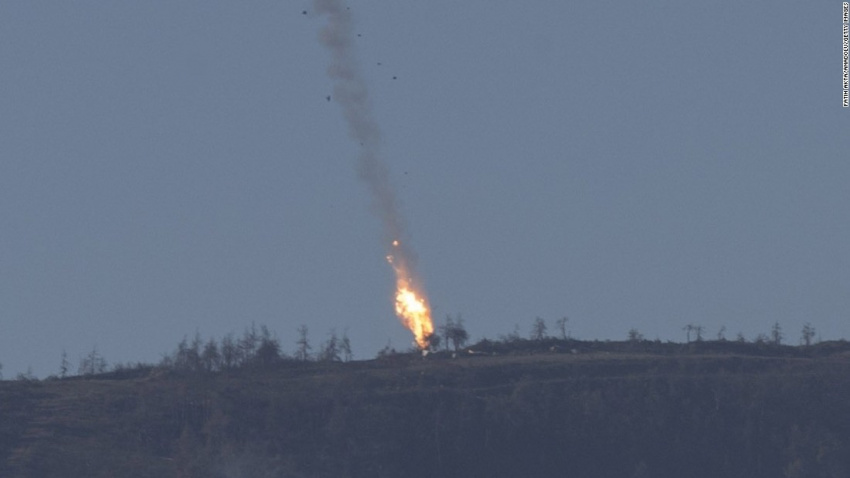Why Did Turkey Down the Russian Jet?

On Tuesday November 24, a Russian Sukhoi fighter was shot down near the Turkey-Syria border by Turkish F16 fighters. One of the pilots was killed. The copilot was rescued by Russian and Syrian special forces, but a Russian soldier lost his life during the rescue operation. Turkey claims that the Russian bomber had violated its airspace, a claim that Russia denied. The incident has led to unprecedented tension between Ankara and Moscow. This is the first time in fifty years that a Russian fighter is targeted by a NATO member.
Why did Turkey down the Russian Sukhoi? The immediate response is that Turkey, like any other sovereign state, is sensitive to its borders. Ankara had shot down a Syrian fighter a few years ago for the same reason. Turkish officials had warned the Russians several times earlier about violating the country's airspace. The Kremlin, however, claims that its fighter had not entered Turkish territory. Interestingly, American officials have stated that the Russian jet's presence in Turkish airspace had not been more than a few seconds.
It seems that Ankara has sent a strong message to Moscow By downing its fighter jet. Turkey is deeply unhappy with Russia's military presence in Syria. Moscow's decision to intervene in the Syrian war has put an end to dreams of overthrowing Bashar Assad through military means. Russian fighters' extensive air raids against ISIS and other armed opposition groups have raised angst and anger among Turkish officials. Erdogan had after all capitalized on anti-Bashar militia.
Turkey may also have dared to down the Russian fighter to stress its role as the big brother of the Turkic Turkmen community of Syria. The Syrian Turkmen, whose population is estimated between one to two million, are part of the anti-Bashar armed opposition. During recent days, their bases were pounded by Russian fighters. From this aspect, downing the Russian fighter would bring popularity for Erdogan inside Turkey.
The recent terrorist attacks in Paris and explosion of the Russian airplane over Egyptian soil had brought Paris and Moscow closer after months of tension over Russia's policy vis-à-vis Ukraine. Shooting down the Russian fighter jet will revive the distinct line between France and Russia, a development Turkey would enjoy. Unlike Paris and Moscow, Ankara's main goal in Syria is to topple Assad, not ISIS.
Eyes are now on Moscow and how the Russians would react to Turkey's act. A few scenarios are predictable now. Any Turkish fighter jet that violates Syria's airspace could be promptly shot by the Russian or Syrian armies. Moscow will probably bolster its support for Assad and intensify its attacks on Da'esh and other armed opposition groups. The Kremlin will also show less flexibility regarding the future of Assad and his likely resignation. It will also try to take revenge from Ankara inside Turkey, by means such as supporting the Kurdistan Workers' Party (PKK).
A weak response by Moscow would give Ankara the upper hand and depict it as the victorious side of the confrontation, and Russians military initiatives from Syria to Ukraine will lose drive. Caution will reign however: Russia is aware of the fact that Turkey is a NATO member; and NATO, on the other side, doesn't want to add insult to Moscow's injury and will limit itself to statements and mild threats.
The incident will stiffen the current arrangement of forces in the Syrian war. Russia will probably move closer to Iran, and the Iran-Russia-Iraq-Syria-Hezbollah bloc will become more tight-knit. On the other side, Turkey, Saudi Arabia, Qatar, UAE and the US will reinforce their alliance. Bashar Assad and Syrian Kurds will find the new situation better serving the interests, although things will become further complicated all in all.
Downing the Russian fighter jet will undermine Turkey's interests in the long run nonetheless. By targeting the Russian Sukhoi 24, Ankara has turned itself into an agent of global powers who are Moscow's rivals. But when the time comes to pay the price, those powers will not stay by Ankara's side. Georgia and Ukraine have learnt that lesson the hard way.
* This piece was originally published in Asr-e Iran, a moderate website affiliated with Parliamentary Speaker Ali Larijani.

